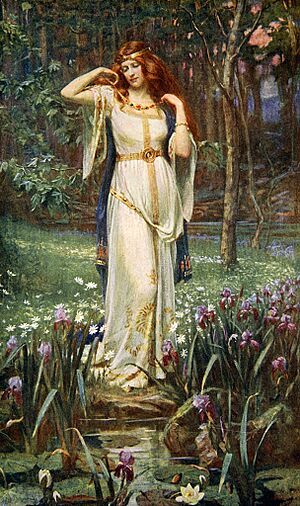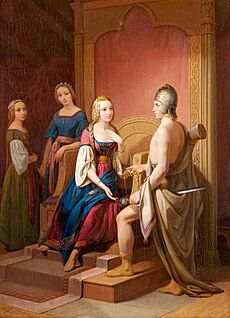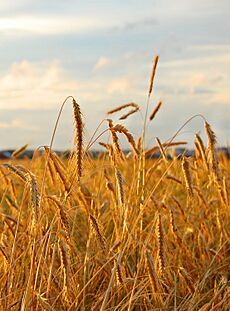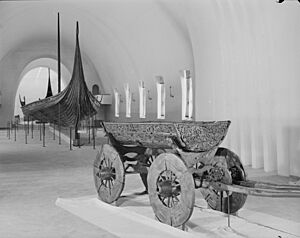Freyja facts for kids
In Norse mythology, Freyja (meaning "the Lady" in Old Norse) is a powerful goddess. She is connected to love, beauty, new life, gold, and even war. Freyja owns a special necklace called Brísingamen. She rides in a chariot pulled by two cats and is sometimes seen with her boar, Hildisvíni. Freyja has a magical cloak made of falcon feathers. This cloak allows her to change into a falcon.
Freyja is the mother of two daughters, Hnoss and Gersemi. Their father is her husband, Óðr. Along with her twin brother Freyr and her father Njörðr, she is a member of the Vanir gods. Freyja rules over her heavenly field, Fólkvangr. There, she welcomes half of the brave warriors who die in battle. The other half go to the god Odin's hall, Valhalla. Her own hall in Fólkvangr is called Sessrúmnir.
Freyja helps other gods by lending them her feathered cloak. People often prayed to her for help with love and new life. Powerful giants sometimes wanted to marry her. Freyja's husband, Óðr, often traveled far away. She cried tears of red gold when he was gone. She searched for him using different names. Freyja has many names, including Gefn, Hörn, Mardöll, Sýr, Vanadís, and Valfreyja.
Stories about Freyja can be found in old texts. These include the Poetic Edda and the Prose Edda. These books were written down in the 13th century. Her stories also appear in other sagas and poems. Even today, Freyja inspires art and is remembered in Scandinavian folklore.
Contents
Understanding Freyja's Name
What Freyja's Name Means
The name Freyja comes from the Old Norse word for 'lady' or 'mistress'. It is similar to the name of the god Freyr, which means 'lord'. This suggests that "Freyja" might have been a title given to her, rather than her original personal name.
Other Names for Freyja
Freyja was known by several other names in ancient stories. These names often described different aspects of her powers or appearance:
- Gefn: This name means 'the giver'. It suggests Freyja's role in bringing good things and happiness.
- Hörn: This name might mean 'flaxen'. It could refer to her beautiful hair or connection to plants.
- Mardöll: This name could mean 'sea-brightener'. It might link her to the sea or to light.
- Sýr: This name means 'sow' (a female pig). Pigs were important symbols for the Vanir gods, especially Freyja and Freyr.
- Vanadís: This means 'the goddess of the Vanir'. It highlights her connection to her family of gods. The chemical element vanadium was later named after this name because of its many beautiful colors.
Freyja in Ancient Stories
Tales from the Poetic Edda
The Poetic Edda is a collection of old Norse poems. It tells us many things about Freyja.
- In the poem Völuspá, Freyja is mentioned as the wife of Óðr. It also tells a story where she was promised to a builder. This builder was actually a giant who was later defeated by Thor.
- The poem Grímnismál explains that Freyja welcomes half of the warriors who die in battle into her hall, Fólkvangr. The other half go to Odin.
- The poem Þrymskviða tells a famous story. The mighty hammer of Thor, Mjöllnir, is stolen. The giant Þrymr says he will only return it if Freyja becomes his bride. Freyja becomes very angry and refuses.
- Freyja was furious!
- The halls of the gods shook.
- She snorted in anger,
- and her necklace, Brísingamen, fell off.
The gods then come up with a plan. They dress Thor in a bridal gown and veil, pretending he is Freyja. Loki dresses as Thor's maid. They travel to the land of the giants. Þrymr is surprised by "Freyja's" huge appetite. Loki explains that "she" hasn't eaten for eight days because she was so excited to get married. The giants are fooled. Thor gets his hammer back and defeats Þrymr.
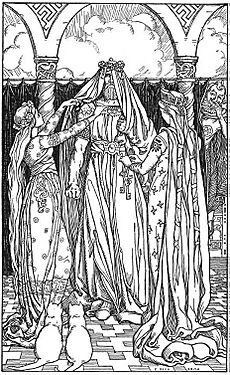
- In Oddrúnargrátr, Freyja is called upon to help a woman give birth to twins.
- The poem Hyndluljóð tells how Freyja helps her loyal servant, Óttar. She turns him into her boar, Hildisvíni. Together, they visit a giantess named Hyndla. Freyja convinces Hyndla to share information about Óttar's family. This helps Óttar claim his inheritance. Freyja praises Óttar for building altars and making offerings to her.
Stories from the Prose Edda
The Prose Edda was written by Snorri Sturluson. It gives more details about the Norse gods.
- It describes Freyja as one of the most glorious goddesses. She lives in Fólkvangr and has a beautiful hall called Sessrúmnir.
- Freyja travels in a chariot pulled by two cats. She is also known as the goddess people can easily pray to for help with love.
- The Prose Edda explains that Freyja's husband, Óðr, often travels. When he is away, Freyja cries tears of red gold. She uses many different names while searching for him.
- Freyja also plays a part in the story of Sleipnir, Odin's eight-legged horse. She was the prize demanded by a giant who offered to build a strong wall for the gods. The gods tricked the giant, and Loki, in the form of a mare, gave birth to Sleipnir.
- At the funeral of Baldr, Freyja attended in her cat-chariot.
- The Prose Edda also mentions that Loki once borrowed Freyja's falcon cloak. He used it to fly to the land of the giants to rescue the goddess Iðunn.
- It also hints at a story where the god Heimdallr recovered Freyja's necklace, Brísingamen, from Loki.
- Giants sometimes threatened to take Freyja. Once, a giant named Hrungnir boasted he would take Freyja and Sif home with him. Freyja was the only one brave enough to offer him a drink. Thor quickly arrived to deal with the giant.
- The tears of red gold Freyja cries for her absent husband are often used in poetry as a way to refer to "gold."
Freyja in Heimskringla
The Heimskringla is a collection of sagas about Norse kings. It describes the gods as ancient leaders.
- In Ynglinga saga, Freyja is introduced as a member of the Vanir. She is the sister of Freyr and daughter of Njörðr.
- After a war between the gods, Odin appointed Freyja as a priestess. She taught the Æsir gods a type of magic called seiðr, which the Vanir already knew.
- The saga says that Freyja became very famous. Because of her fame, important women were sometimes called by names similar to hers, like frúvor (ladies). A woman who owned her property was called freyja.
- Freyja was known for being very clever. She and her husband Óðr had two beautiful daughters, Gersemi and Hnoss. Their names were used to describe precious possessions.
Other Sagas and Tales
Freyja is also mentioned in other old Norse stories:
- In Egils saga, a girl named Þorgerðr (Thorgerd) says she will starve herself to death to join Freyja. This shows how people believed in an afterlife with the goddess.
- In Hálfs saga ok Hálfsrekka, a queen named Signy prays to Freyja for help. She asks for help to brew the best ale in a competition. Signy's brew wins the contest.
Even after Scandinavia became Christian, belief in Freyja continued in some ways. Her stories blended into local folk tales.
- In Iceland, people called on Freyja for help using Icelandic magical staves as late as the 18th century.
- In rural Sweden during the 19th century, Freyja was still seen as a goddess of new life and good harvests.
- Old folk songs in Scandinavia kept parts of the Þrymskviða story. In some Swedish songs, Freyja became "Frojenborg."
- In the Swedish province of Småland, people connected Freyja with sheet lightning. They believed she was checking if the rye crops were ripe. An old woman once said, "Don't be afraid little child, it is only Freyja who is out making fire with steel and flintstone to see if the rye is ripe. She is kind to people."
- In Värend, Sweden, people believed Freyja would visit on Christmas night. She would shake apple trees to ensure a good harvest. They would leave apples in the trees for her.
Today, many people who follow Asatru honor Freyja. They see her as a goddess of new life, abundance, and beauty. Some followers bake special foods connected to love as a way to honor her. Freyja is also called upon for protection.
Freyja's Name in Places and Plants
Names from Freyja
Many places in Norway and Sweden were named after Freyja. This shows how important she was to the people.
- In Norway, you can find place names like Frøihov, which means "Freyja's hof" (a type of temple).
- In Sweden, places like Frövi mean "Freyja's vé" (a sacred place). Other names like *Freyjulundr mean 'Freyja's sacred grove'.
- Her other name, Hörn, appears in Swedish place names like Härnevi and Järnevi. These mean "Hörn's sacred place."
Plants and Stars Named After Freyja
Several plants were named after Freyja. For example, Freyja's tears and Freyja's hair (a flower called Polygala vulgaris). However, during the time when Christianity spread, these plant names were often changed to honor the Virgin Mary instead.
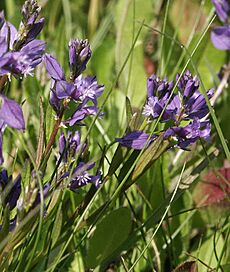
Before Christianity, the Orion constellation in the sky was sometimes called Freyja's distaff (a tool for spinning yarn).
Ancient Discoveries and Art
Archaeological Finds
Archaeologists have found items that might be linked to Freyja.
- In Hagebyhöga, Sweden, a rich burial from around the year 1000 was found. It contained a silver pendant showing a woman with a wide necklace. This necklace might be Freyja's Brísingamen. Many believe this pendant shows Freyja herself.
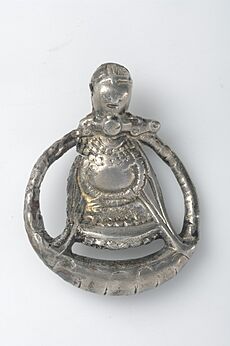
- A 7th-century metal disk found in Germany shows a female figure with two braids. She is flanked by two cat-like creatures and holds a staff. This figure is thought to be Freyja.
- The famous 10th-century Oseberg ship burial in Norway included a ceremonial wagon. One side of the wagon has a carving of nine cats. Scholars connect this to Freyja's chariot pulled by cats.
Historic Depictions
- A 12th-century painting in the Schleswig Cathedral in Germany shows a cloaked woman riding a large cat. This figure is believed to be Freyja.
Freyja in Modern Art and Culture
Freyja has continued to inspire artists and writers through the centuries.
- In the 18th century, Swedish literature often saw Freyja as a Scandinavian version of the Roman goddess Venus.
- The 19th-century Danish poet Adam Gottlob Oehlenschläger mentioned Freyja in Denmark's national anthem. He also wrote a play and a poem about her.
- The German composer Richard Wagner included a character named Freia in his opera Der Ring des Nibelungen. This character combines aspects of Freyja and the goddess Iðunn.
- Many artworks in the late 19th and early 20th centuries featured Freyja. These include statues, paintings, and drawings by artists like H. E. Freund, Nils Blommér, and Anders Zorn.
- Her name, Vanadís, even inspired the name of the chemical element vanadium. This was because vanadium forms many beautiful colored compounds.
Images for kids
See also
 In Spanish: Freyja para niños
In Spanish: Freyja para niños
- List of Germanic deities
- List of people, items and places in Norse mythology
- Category:Norse underworld
 | Bessie Coleman |
 | Spann Watson |
 | Jill E. Brown |
 | Sherman W. White |


